Impact of Obesity on Young People's Health: A Nursing Essay
VerifiedAdded on 2023/06/10
|8
|2960
|392
Essay
AI Summary
This essay explores the significant public health issue of obesity among young people, examining its impact on physical, mental, and social health. It delves into the various factors contributing to obesity, including lifestyle, genetics, nutrition, and environmental influences, as well as the role of cultural health beliefs and global/national influences on health determinants. The essay emphasizes the importance of effective communication and health promotion strategies, particularly within the context of nursing care. It highlights the significance of addressing inequalities in health, the use of health promotion models, and the vital role of healthcare providers in promoting healthy lifestyles and providing support for individuals struggling with obesity. The conclusion reinforces the need for comprehensive interventions to mitigate the adverse effects of obesity on young people's overall well-being and quality of life.
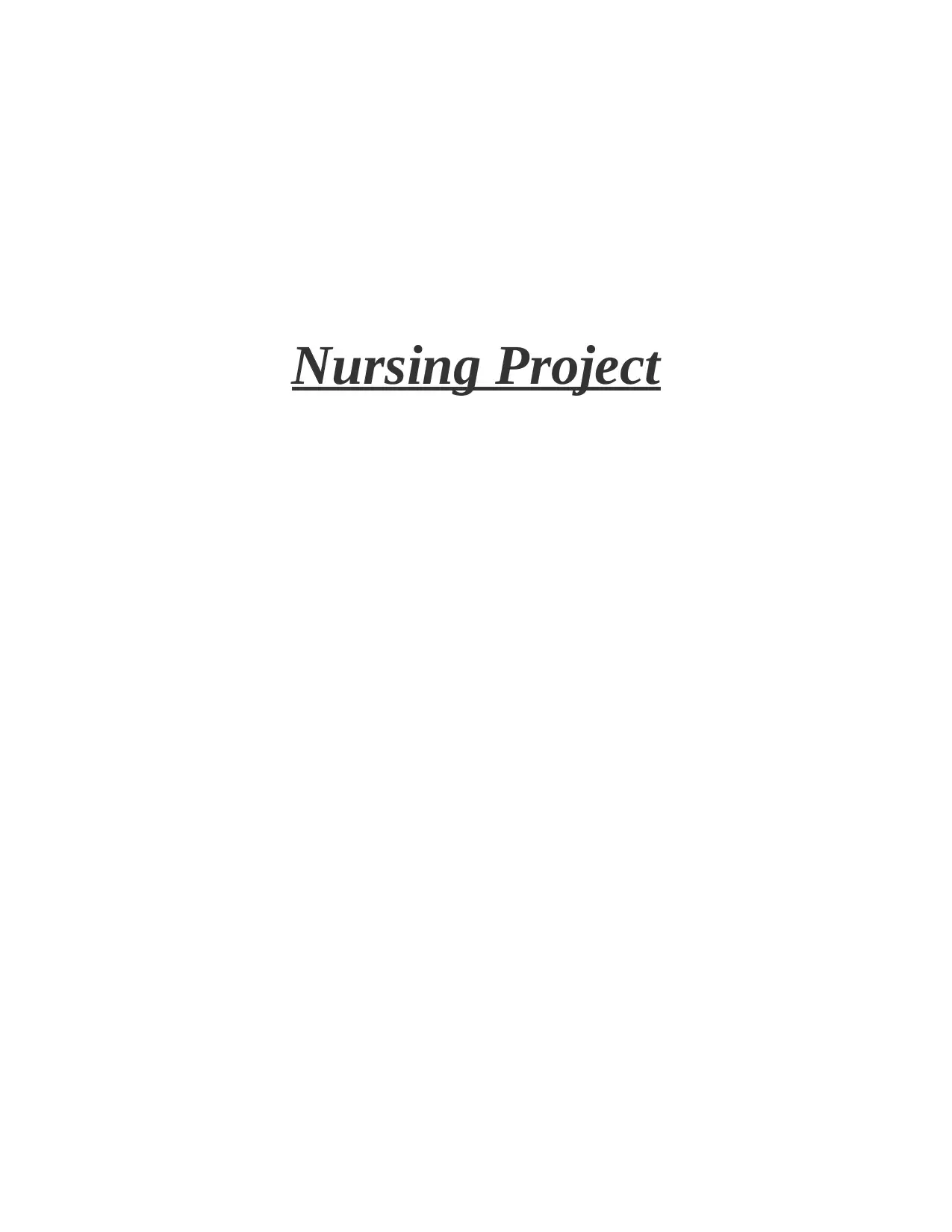
Nursing Project
Paraphrase This Document
Need a fresh take? Get an instant paraphrase of this document with our AI Paraphraser
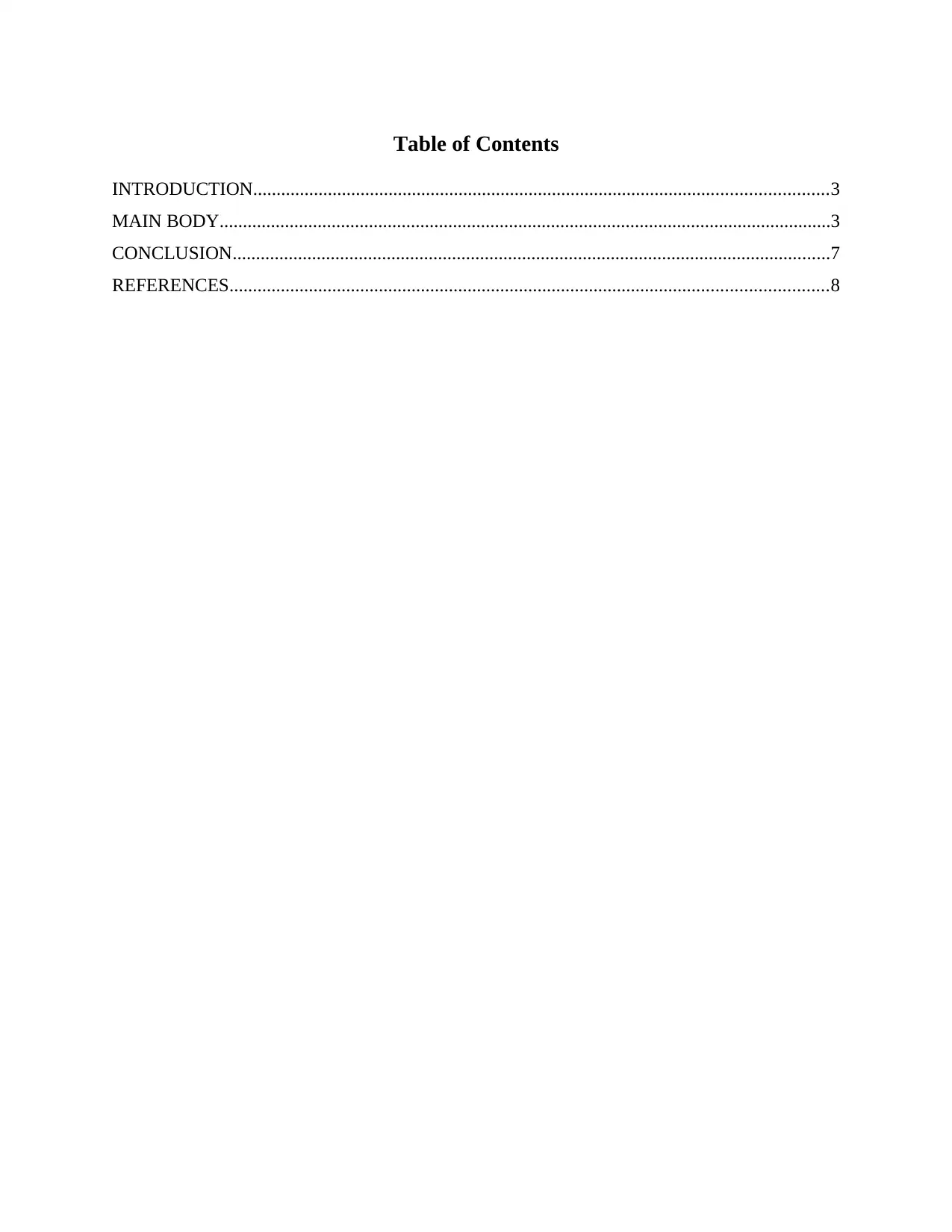
Table of Contents
INTRODUCTION...........................................................................................................................3
MAIN BODY...................................................................................................................................3
CONCLUSION................................................................................................................................7
REFERENCES................................................................................................................................8
INTRODUCTION...........................................................................................................................3
MAIN BODY...................................................................................................................................3
CONCLUSION................................................................................................................................7
REFERENCES................................................................................................................................8
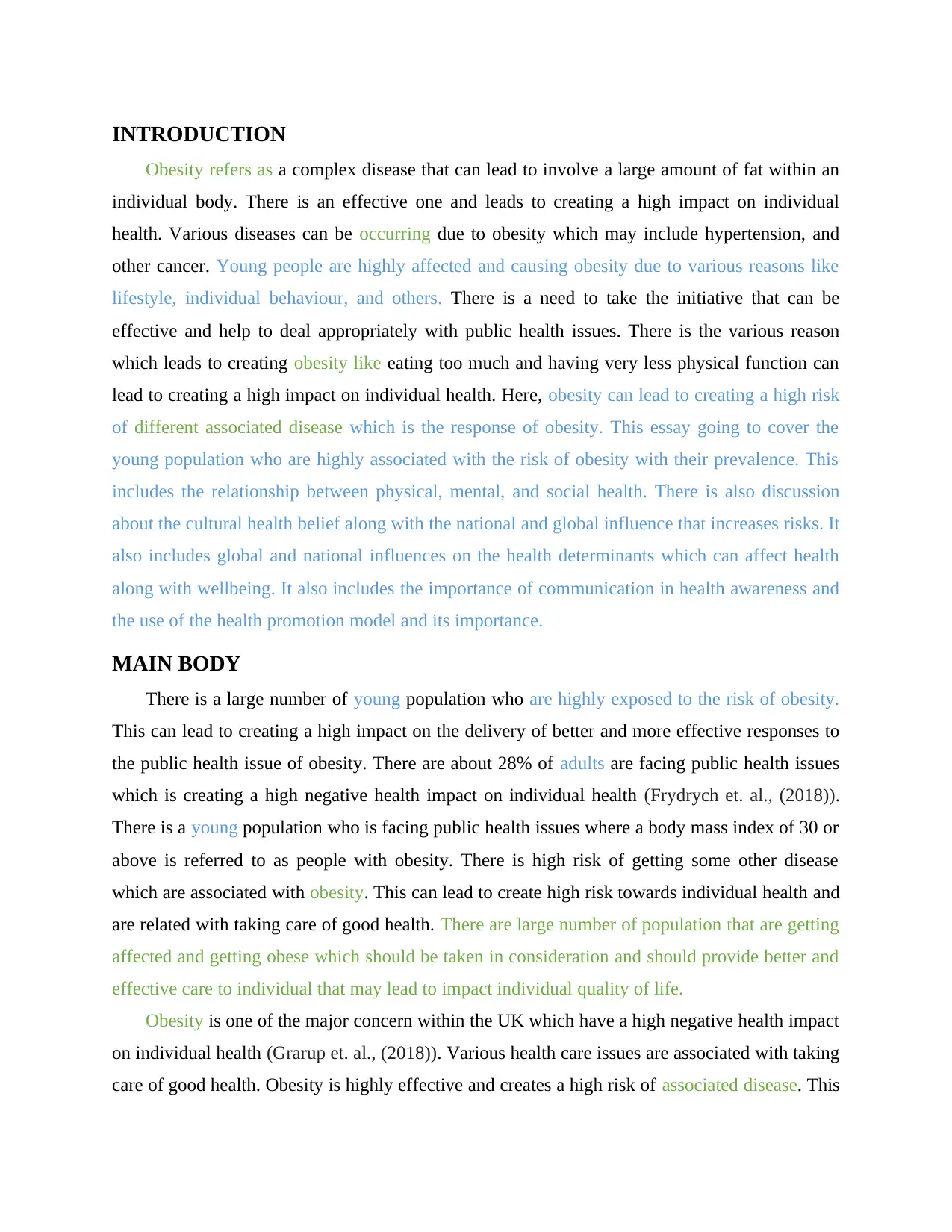
INTRODUCTION
Obesity refers as a complex disease that can lead to involve a large amount of fat within an
individual body. There is an effective one and leads to creating a high impact on individual
health. Various diseases can be occurring due to obesity which may include hypertension, and
other cancer. Young people are highly affected and causing obesity due to various reasons like
lifestyle, individual behaviour, and others. There is a need to take the initiative that can be
effective and help to deal appropriately with public health issues. There is the various reason
which leads to creating obesity like eating too much and having very less physical function can
lead to creating a high impact on individual health. Here, obesity can lead to creating a high risk
of different associated disease which is the response of obesity. This essay going to cover the
young population who are highly associated with the risk of obesity with their prevalence. This
includes the relationship between physical, mental, and social health. There is also discussion
about the cultural health belief along with the national and global influence that increases risks. It
also includes global and national influences on the health determinants which can affect health
along with wellbeing. It also includes the importance of communication in health awareness and
the use of the health promotion model and its importance.
MAIN BODY
There is a large number of young population who are highly exposed to the risk of obesity.
This can lead to creating a high impact on the delivery of better and more effective responses to
the public health issue of obesity. There are about 28% of adults are facing public health issues
which is creating a high negative health impact on individual health (Frydrych et. al., (2018)).
There is a young population who is facing public health issues where a body mass index of 30 or
above is referred to as people with obesity. There is high risk of getting some other disease
which are associated with obesity. This can lead to create high risk towards individual health and
are related with taking care of good health. There are large number of population that are getting
affected and getting obese which should be taken in consideration and should provide better and
effective care to individual that may lead to impact individual quality of life.
Obesity is one of the major concern within the UK which have a high negative health impact
on individual health (Grarup et. al., (2018)). Various health care issues are associated with taking
care of good health. Obesity is highly effective and creates a high risk of associated disease. This
Obesity refers as a complex disease that can lead to involve a large amount of fat within an
individual body. There is an effective one and leads to creating a high impact on individual
health. Various diseases can be occurring due to obesity which may include hypertension, and
other cancer. Young people are highly affected and causing obesity due to various reasons like
lifestyle, individual behaviour, and others. There is a need to take the initiative that can be
effective and help to deal appropriately with public health issues. There is the various reason
which leads to creating obesity like eating too much and having very less physical function can
lead to creating a high impact on individual health. Here, obesity can lead to creating a high risk
of different associated disease which is the response of obesity. This essay going to cover the
young population who are highly associated with the risk of obesity with their prevalence. This
includes the relationship between physical, mental, and social health. There is also discussion
about the cultural health belief along with the national and global influence that increases risks. It
also includes global and national influences on the health determinants which can affect health
along with wellbeing. It also includes the importance of communication in health awareness and
the use of the health promotion model and its importance.
MAIN BODY
There is a large number of young population who are highly exposed to the risk of obesity.
This can lead to creating a high impact on the delivery of better and more effective responses to
the public health issue of obesity. There are about 28% of adults are facing public health issues
which is creating a high negative health impact on individual health (Frydrych et. al., (2018)).
There is a young population who is facing public health issues where a body mass index of 30 or
above is referred to as people with obesity. There is high risk of getting some other disease
which are associated with obesity. This can lead to create high risk towards individual health and
are related with taking care of good health. There are large number of population that are getting
affected and getting obese which should be taken in consideration and should provide better and
effective care to individual that may lead to impact individual quality of life.
Obesity is one of the major concern within the UK which have a high negative health impact
on individual health (Grarup et. al., (2018)). Various health care issues are associated with taking
care of good health. Obesity is highly effective and creates a high risk of associated disease. This
⊘ This is a preview!⊘
Do you want full access?
Subscribe today to unlock all pages.

Trusted by 1+ million students worldwide
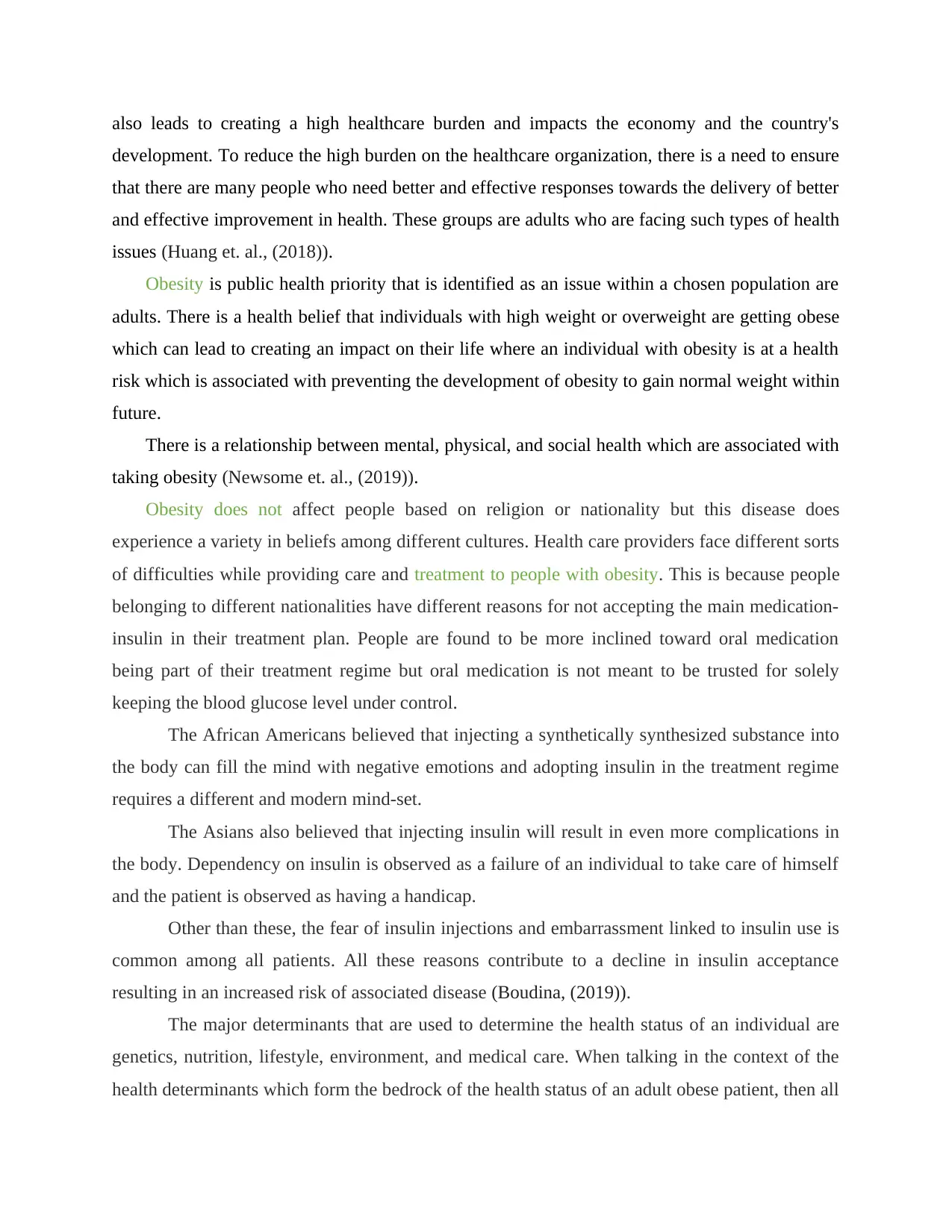
also leads to creating a high healthcare burden and impacts the economy and the country's
development. To reduce the high burden on the healthcare organization, there is a need to ensure
that there are many people who need better and effective responses towards the delivery of better
and effective improvement in health. These groups are adults who are facing such types of health
issues (Huang et. al., (2018)).
Obesity is public health priority that is identified as an issue within a chosen population are
adults. There is a health belief that individuals with high weight or overweight are getting obese
which can lead to creating an impact on their life where an individual with obesity is at a health
risk which is associated with preventing the development of obesity to gain normal weight within
future.
There is a relationship between mental, physical, and social health which are associated with
taking obesity (Newsome et. al., (2019)).
Obesity does not affect people based on religion or nationality but this disease does
experience a variety in beliefs among different cultures. Health care providers face different sorts
of difficulties while providing care and treatment to people with obesity. This is because people
belonging to different nationalities have different reasons for not accepting the main medication-
insulin in their treatment plan. People are found to be more inclined toward oral medication
being part of their treatment regime but oral medication is not meant to be trusted for solely
keeping the blood glucose level under control.
The African Americans believed that injecting a synthetically synthesized substance into
the body can fill the mind with negative emotions and adopting insulin in the treatment regime
requires a different and modern mind-set.
The Asians also believed that injecting insulin will result in even more complications in
the body. Dependency on insulin is observed as a failure of an individual to take care of himself
and the patient is observed as having a handicap.
Other than these, the fear of insulin injections and embarrassment linked to insulin use is
common among all patients. All these reasons contribute to a decline in insulin acceptance
resulting in an increased risk of associated disease (Boudina, (2019)).
The major determinants that are used to determine the health status of an individual are
genetics, nutrition, lifestyle, environment, and medical care. When talking in the context of the
health determinants which form the bedrock of the health status of an adult obese patient, then all
development. To reduce the high burden on the healthcare organization, there is a need to ensure
that there are many people who need better and effective responses towards the delivery of better
and effective improvement in health. These groups are adults who are facing such types of health
issues (Huang et. al., (2018)).
Obesity is public health priority that is identified as an issue within a chosen population are
adults. There is a health belief that individuals with high weight or overweight are getting obese
which can lead to creating an impact on their life where an individual with obesity is at a health
risk which is associated with preventing the development of obesity to gain normal weight within
future.
There is a relationship between mental, physical, and social health which are associated with
taking obesity (Newsome et. al., (2019)).
Obesity does not affect people based on religion or nationality but this disease does
experience a variety in beliefs among different cultures. Health care providers face different sorts
of difficulties while providing care and treatment to people with obesity. This is because people
belonging to different nationalities have different reasons for not accepting the main medication-
insulin in their treatment plan. People are found to be more inclined toward oral medication
being part of their treatment regime but oral medication is not meant to be trusted for solely
keeping the blood glucose level under control.
The African Americans believed that injecting a synthetically synthesized substance into
the body can fill the mind with negative emotions and adopting insulin in the treatment regime
requires a different and modern mind-set.
The Asians also believed that injecting insulin will result in even more complications in
the body. Dependency on insulin is observed as a failure of an individual to take care of himself
and the patient is observed as having a handicap.
Other than these, the fear of insulin injections and embarrassment linked to insulin use is
common among all patients. All these reasons contribute to a decline in insulin acceptance
resulting in an increased risk of associated disease (Boudina, (2019)).
The major determinants that are used to determine the health status of an individual are
genetics, nutrition, lifestyle, environment, and medical care. When talking in the context of the
health determinants which form the bedrock of the health status of an adult obese patient, then all
Paraphrase This Document
Need a fresh take? Get an instant paraphrase of this document with our AI Paraphraser
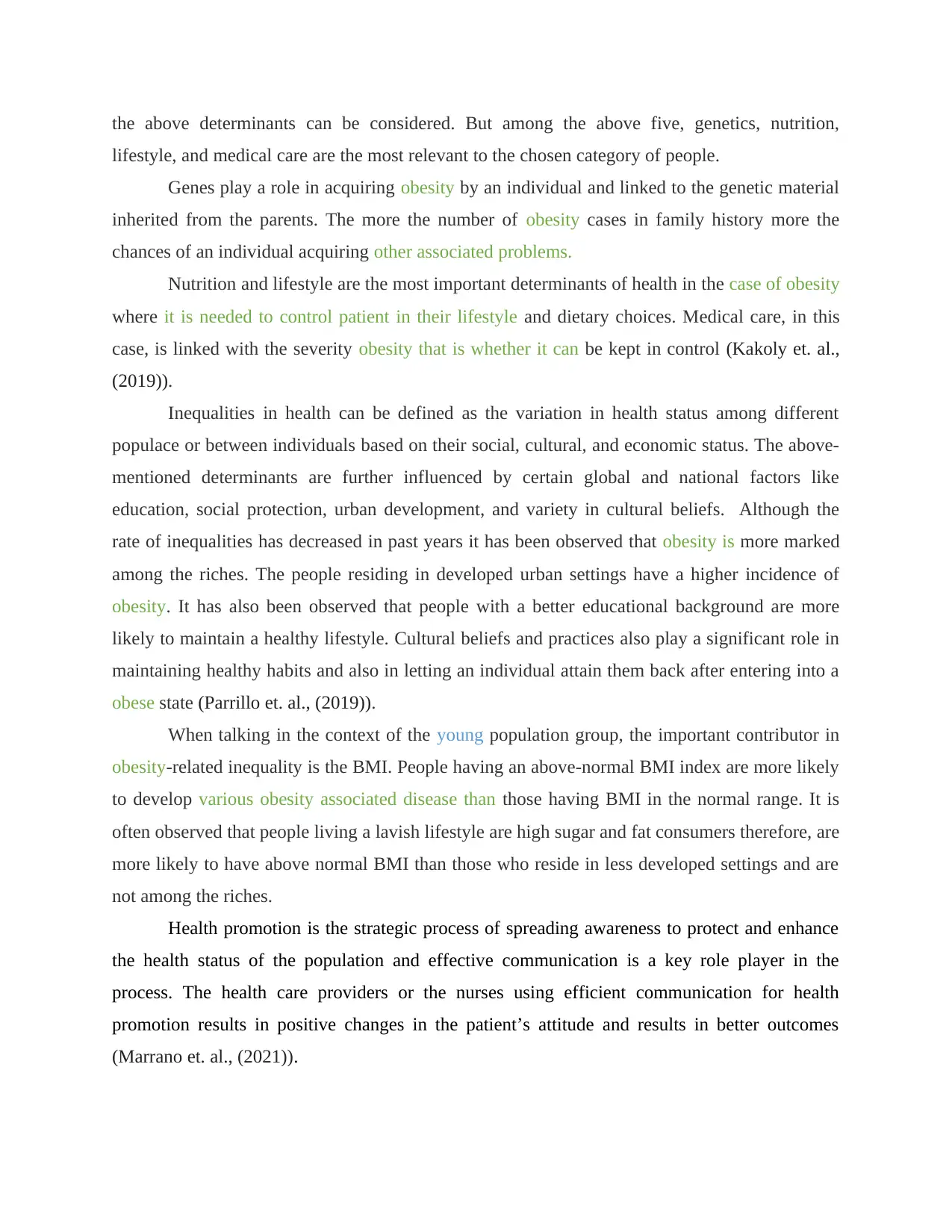
the above determinants can be considered. But among the above five, genetics, nutrition,
lifestyle, and medical care are the most relevant to the chosen category of people.
Genes play a role in acquiring obesity by an individual and linked to the genetic material
inherited from the parents. The more the number of obesity cases in family history more the
chances of an individual acquiring other associated problems.
Nutrition and lifestyle are the most important determinants of health in the case of obesity
where it is needed to control patient in their lifestyle and dietary choices. Medical care, in this
case, is linked with the severity obesity that is whether it can be kept in control (Kakoly et. al.,
(2019)).
Inequalities in health can be defined as the variation in health status among different
populace or between individuals based on their social, cultural, and economic status. The above-
mentioned determinants are further influenced by certain global and national factors like
education, social protection, urban development, and variety in cultural beliefs. Although the
rate of inequalities has decreased in past years it has been observed that obesity is more marked
among the riches. The people residing in developed urban settings have a higher incidence of
obesity. It has also been observed that people with a better educational background are more
likely to maintain a healthy lifestyle. Cultural beliefs and practices also play a significant role in
maintaining healthy habits and also in letting an individual attain them back after entering into a
obese state (Parrillo et. al., (2019)).
When talking in the context of the young population group, the important contributor in
obesity-related inequality is the BMI. People having an above-normal BMI index are more likely
to develop various obesity associated disease than those having BMI in the normal range. It is
often observed that people living a lavish lifestyle are high sugar and fat consumers therefore, are
more likely to have above normal BMI than those who reside in less developed settings and are
not among the riches.
Health promotion is the strategic process of spreading awareness to protect and enhance
the health status of the population and effective communication is a key role player in the
process. The health care providers or the nurses using efficient communication for health
promotion results in positive changes in the patient’s attitude and results in better outcomes
(Marrano et. al., (2021)).
lifestyle, and medical care are the most relevant to the chosen category of people.
Genes play a role in acquiring obesity by an individual and linked to the genetic material
inherited from the parents. The more the number of obesity cases in family history more the
chances of an individual acquiring other associated problems.
Nutrition and lifestyle are the most important determinants of health in the case of obesity
where it is needed to control patient in their lifestyle and dietary choices. Medical care, in this
case, is linked with the severity obesity that is whether it can be kept in control (Kakoly et. al.,
(2019)).
Inequalities in health can be defined as the variation in health status among different
populace or between individuals based on their social, cultural, and economic status. The above-
mentioned determinants are further influenced by certain global and national factors like
education, social protection, urban development, and variety in cultural beliefs. Although the
rate of inequalities has decreased in past years it has been observed that obesity is more marked
among the riches. The people residing in developed urban settings have a higher incidence of
obesity. It has also been observed that people with a better educational background are more
likely to maintain a healthy lifestyle. Cultural beliefs and practices also play a significant role in
maintaining healthy habits and also in letting an individual attain them back after entering into a
obese state (Parrillo et. al., (2019)).
When talking in the context of the young population group, the important contributor in
obesity-related inequality is the BMI. People having an above-normal BMI index are more likely
to develop various obesity associated disease than those having BMI in the normal range. It is
often observed that people living a lavish lifestyle are high sugar and fat consumers therefore, are
more likely to have above normal BMI than those who reside in less developed settings and are
not among the riches.
Health promotion is the strategic process of spreading awareness to protect and enhance
the health status of the population and effective communication is a key role player in the
process. The health care providers or the nurses using efficient communication for health
promotion results in positive changes in the patient’s attitude and results in better outcomes
(Marrano et. al., (2021)).
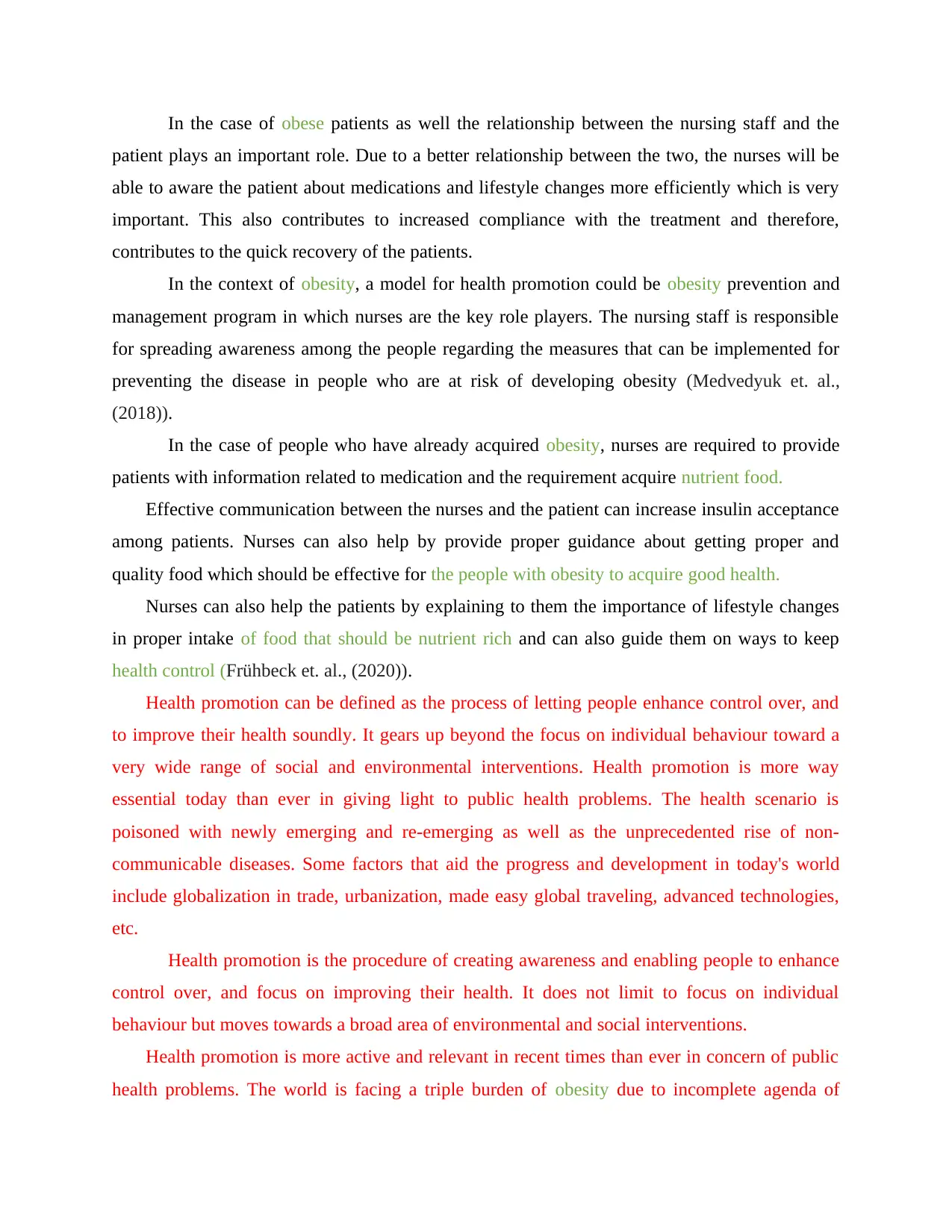
In the case of obese patients as well the relationship between the nursing staff and the
patient plays an important role. Due to a better relationship between the two, the nurses will be
able to aware the patient about medications and lifestyle changes more efficiently which is very
important. This also contributes to increased compliance with the treatment and therefore,
contributes to the quick recovery of the patients.
In the context of obesity, a model for health promotion could be obesity prevention and
management program in which nurses are the key role players. The nursing staff is responsible
for spreading awareness among the people regarding the measures that can be implemented for
preventing the disease in people who are at risk of developing obesity (Medvedyuk et. al.,
(2018)).
In the case of people who have already acquired obesity, nurses are required to provide
patients with information related to medication and the requirement acquire nutrient food.
Effective communication between the nurses and the patient can increase insulin acceptance
among patients. Nurses can also help by provide proper guidance about getting proper and
quality food which should be effective for the people with obesity to acquire good health.
Nurses can also help the patients by explaining to them the importance of lifestyle changes
in proper intake of food that should be nutrient rich and can also guide them on ways to keep
health control (Frühbeck et. al., (2020)).
Health promotion can be defined as the process of letting people enhance control over, and
to improve their health soundly. It gears up beyond the focus on individual behaviour toward a
very wide range of social and environmental interventions. Health promotion is more way
essential today than ever in giving light to public health problems. The health scenario is
poisoned with newly emerging and re-emerging as well as the unprecedented rise of non-
communicable diseases. Some factors that aid the progress and development in today's world
include globalization in trade, urbanization, made easy global traveling, advanced technologies,
etc.
Health promotion is the procedure of creating awareness and enabling people to enhance
control over, and focus on improving their health. It does not limit to focus on individual
behaviour but moves towards a broad area of environmental and social interventions.
Health promotion is more active and relevant in recent times than ever in concern of public
health problems. The world is facing a triple burden of obesity due to incomplete agenda of
patient plays an important role. Due to a better relationship between the two, the nurses will be
able to aware the patient about medications and lifestyle changes more efficiently which is very
important. This also contributes to increased compliance with the treatment and therefore,
contributes to the quick recovery of the patients.
In the context of obesity, a model for health promotion could be obesity prevention and
management program in which nurses are the key role players. The nursing staff is responsible
for spreading awareness among the people regarding the measures that can be implemented for
preventing the disease in people who are at risk of developing obesity (Medvedyuk et. al.,
(2018)).
In the case of people who have already acquired obesity, nurses are required to provide
patients with information related to medication and the requirement acquire nutrient food.
Effective communication between the nurses and the patient can increase insulin acceptance
among patients. Nurses can also help by provide proper guidance about getting proper and
quality food which should be effective for the people with obesity to acquire good health.
Nurses can also help the patients by explaining to them the importance of lifestyle changes
in proper intake of food that should be nutrient rich and can also guide them on ways to keep
health control (Frühbeck et. al., (2020)).
Health promotion can be defined as the process of letting people enhance control over, and
to improve their health soundly. It gears up beyond the focus on individual behaviour toward a
very wide range of social and environmental interventions. Health promotion is more way
essential today than ever in giving light to public health problems. The health scenario is
poisoned with newly emerging and re-emerging as well as the unprecedented rise of non-
communicable diseases. Some factors that aid the progress and development in today's world
include globalization in trade, urbanization, made easy global traveling, advanced technologies,
etc.
Health promotion is the procedure of creating awareness and enabling people to enhance
control over, and focus on improving their health. It does not limit to focus on individual
behaviour but moves towards a broad area of environmental and social interventions.
Health promotion is more active and relevant in recent times than ever in concern of public
health problems. The world is facing a triple burden of obesity due to incomplete agenda of
⊘ This is a preview!⊘
Do you want full access?
Subscribe today to unlock all pages.

Trusted by 1+ million students worldwide
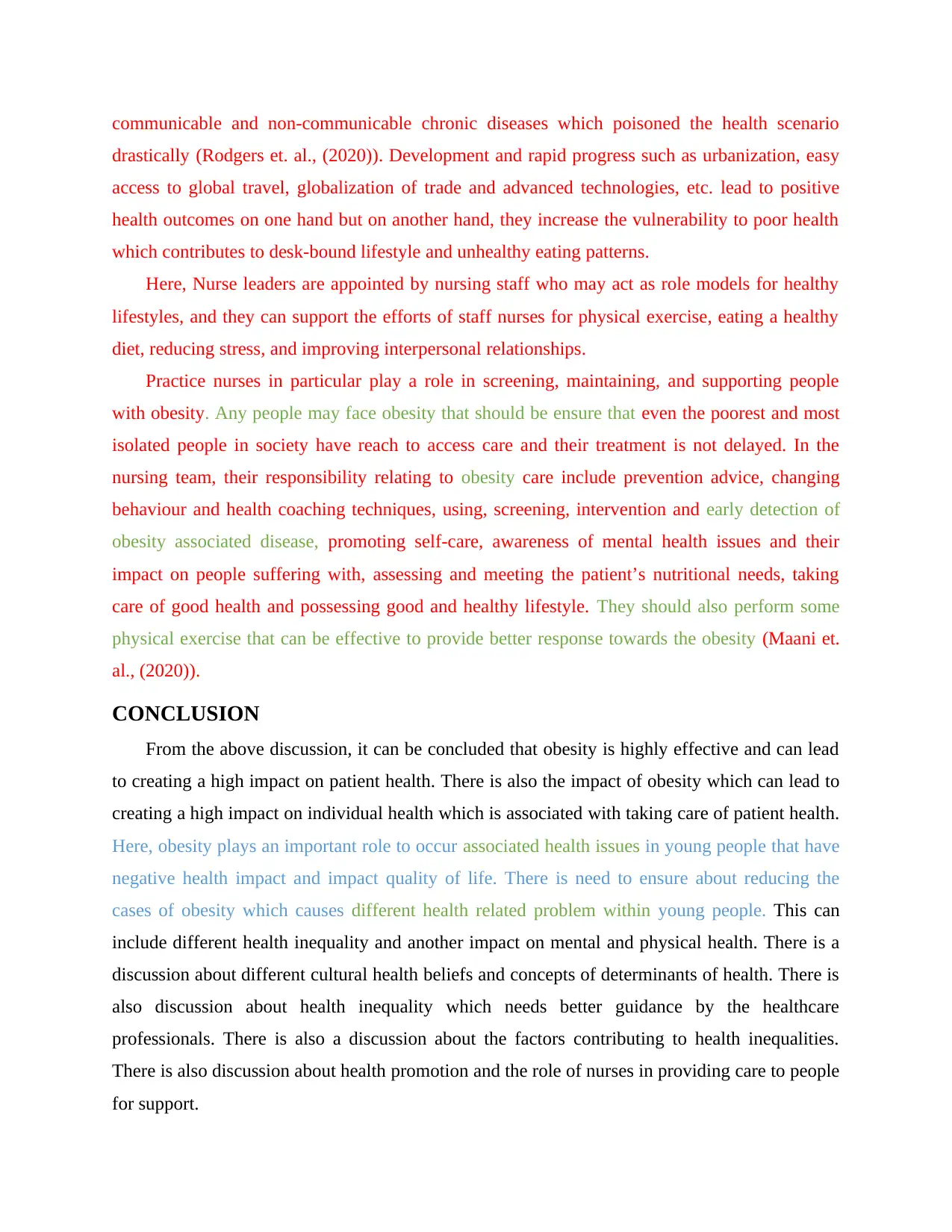
communicable and non-communicable chronic diseases which poisoned the health scenario
drastically (Rodgers et. al., (2020)). Development and rapid progress such as urbanization, easy
access to global travel, globalization of trade and advanced technologies, etc. lead to positive
health outcomes on one hand but on another hand, they increase the vulnerability to poor health
which contributes to desk-bound lifestyle and unhealthy eating patterns.
Here, Nurse leaders are appointed by nursing staff who may act as role models for healthy
lifestyles, and they can support the efforts of staff nurses for physical exercise, eating a healthy
diet, reducing stress, and improving interpersonal relationships.
Practice nurses in particular play a role in screening, maintaining, and supporting people
with obesity. Any people may face obesity that should be ensure that even the poorest and most
isolated people in society have reach to access care and their treatment is not delayed. In the
nursing team, their responsibility relating to obesity care include prevention advice, changing
behaviour and health coaching techniques, using, screening, intervention and early detection of
obesity associated disease, promoting self-care, awareness of mental health issues and their
impact on people suffering with, assessing and meeting the patient’s nutritional needs, taking
care of good health and possessing good and healthy lifestyle. They should also perform some
physical exercise that can be effective to provide better response towards the obesity (Maani et.
al., (2020)).
CONCLUSION
From the above discussion, it can be concluded that obesity is highly effective and can lead
to creating a high impact on patient health. There is also the impact of obesity which can lead to
creating a high impact on individual health which is associated with taking care of patient health.
Here, obesity plays an important role to occur associated health issues in young people that have
negative health impact and impact quality of life. There is need to ensure about reducing the
cases of obesity which causes different health related problem within young people. This can
include different health inequality and another impact on mental and physical health. There is a
discussion about different cultural health beliefs and concepts of determinants of health. There is
also discussion about health inequality which needs better guidance by the healthcare
professionals. There is also a discussion about the factors contributing to health inequalities.
There is also discussion about health promotion and the role of nurses in providing care to people
for support.
drastically (Rodgers et. al., (2020)). Development and rapid progress such as urbanization, easy
access to global travel, globalization of trade and advanced technologies, etc. lead to positive
health outcomes on one hand but on another hand, they increase the vulnerability to poor health
which contributes to desk-bound lifestyle and unhealthy eating patterns.
Here, Nurse leaders are appointed by nursing staff who may act as role models for healthy
lifestyles, and they can support the efforts of staff nurses for physical exercise, eating a healthy
diet, reducing stress, and improving interpersonal relationships.
Practice nurses in particular play a role in screening, maintaining, and supporting people
with obesity. Any people may face obesity that should be ensure that even the poorest and most
isolated people in society have reach to access care and their treatment is not delayed. In the
nursing team, their responsibility relating to obesity care include prevention advice, changing
behaviour and health coaching techniques, using, screening, intervention and early detection of
obesity associated disease, promoting self-care, awareness of mental health issues and their
impact on people suffering with, assessing and meeting the patient’s nutritional needs, taking
care of good health and possessing good and healthy lifestyle. They should also perform some
physical exercise that can be effective to provide better response towards the obesity (Maani et.
al., (2020)).
CONCLUSION
From the above discussion, it can be concluded that obesity is highly effective and can lead
to creating a high impact on patient health. There is also the impact of obesity which can lead to
creating a high impact on individual health which is associated with taking care of patient health.
Here, obesity plays an important role to occur associated health issues in young people that have
negative health impact and impact quality of life. There is need to ensure about reducing the
cases of obesity which causes different health related problem within young people. This can
include different health inequality and another impact on mental and physical health. There is a
discussion about different cultural health beliefs and concepts of determinants of health. There is
also discussion about health inequality which needs better guidance by the healthcare
professionals. There is also a discussion about the factors contributing to health inequalities.
There is also discussion about health promotion and the role of nurses in providing care to people
for support.
Paraphrase This Document
Need a fresh take? Get an instant paraphrase of this document with our AI Paraphraser
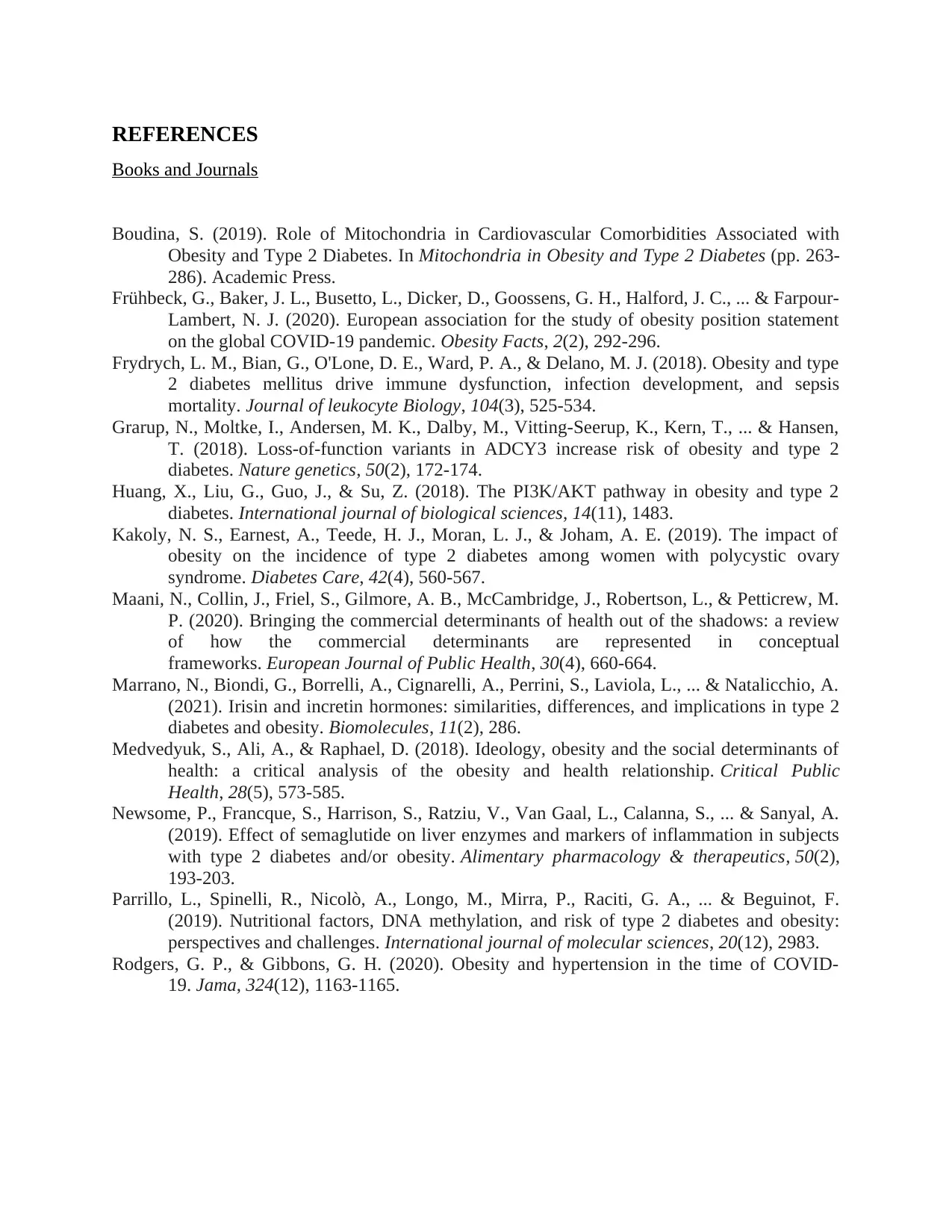
REFERENCES
Books and Journals
Boudina, S. (2019). Role of Mitochondria in Cardiovascular Comorbidities Associated with
Obesity and Type 2 Diabetes. In Mitochondria in Obesity and Type 2 Diabetes (pp. 263-
286). Academic Press.
Frühbeck, G., Baker, J. L., Busetto, L., Dicker, D., Goossens, G. H., Halford, J. C., ... & Farpour-
Lambert, N. J. (2020). European association for the study of obesity position statement
on the global COVID-19 pandemic. Obesity Facts, 2(2), 292-296.
Frydrych, L. M., Bian, G., O'Lone, D. E., Ward, P. A., & Delano, M. J. (2018). Obesity and type
2 diabetes mellitus drive immune dysfunction, infection development, and sepsis
mortality. Journal of leukocyte Biology, 104(3), 525-534.
Grarup, N., Moltke, I., Andersen, M. K., Dalby, M., Vitting-Seerup, K., Kern, T., ... & Hansen,
T. (2018). Loss-of-function variants in ADCY3 increase risk of obesity and type 2
diabetes. Nature genetics, 50(2), 172-174.
Huang, X., Liu, G., Guo, J., & Su, Z. (2018). The PI3K/AKT pathway in obesity and type 2
diabetes. International journal of biological sciences, 14(11), 1483.
Kakoly, N. S., Earnest, A., Teede, H. J., Moran, L. J., & Joham, A. E. (2019). The impact of
obesity on the incidence of type 2 diabetes among women with polycystic ovary
syndrome. Diabetes Care, 42(4), 560-567.
Maani, N., Collin, J., Friel, S., Gilmore, A. B., McCambridge, J., Robertson, L., & Petticrew, M.
P. (2020). Bringing the commercial determinants of health out of the shadows: a review
of how the commercial determinants are represented in conceptual
frameworks. European Journal of Public Health, 30(4), 660-664.
Marrano, N., Biondi, G., Borrelli, A., Cignarelli, A., Perrini, S., Laviola, L., ... & Natalicchio, A.
(2021). Irisin and incretin hormones: similarities, differences, and implications in type 2
diabetes and obesity. Biomolecules, 11(2), 286.
Medvedyuk, S., Ali, A., & Raphael, D. (2018). Ideology, obesity and the social determinants of
health: a critical analysis of the obesity and health relationship. Critical Public
Health, 28(5), 573-585.
Newsome, P., Francque, S., Harrison, S., Ratziu, V., Van Gaal, L., Calanna, S., ... & Sanyal, A.
(2019). Effect of semaglutide on liver enzymes and markers of inflammation in subjects
with type 2 diabetes and/or obesity. Alimentary pharmacology & therapeutics, 50(2),
193-203.
Parrillo, L., Spinelli, R., Nicolò, A., Longo, M., Mirra, P., Raciti, G. A., ... & Beguinot, F.
(2019). Nutritional factors, DNA methylation, and risk of type 2 diabetes and obesity:
perspectives and challenges. International journal of molecular sciences, 20(12), 2983.
Rodgers, G. P., & Gibbons, G. H. (2020). Obesity and hypertension in the time of COVID-
19. Jama, 324(12), 1163-1165.
Books and Journals
Boudina, S. (2019). Role of Mitochondria in Cardiovascular Comorbidities Associated with
Obesity and Type 2 Diabetes. In Mitochondria in Obesity and Type 2 Diabetes (pp. 263-
286). Academic Press.
Frühbeck, G., Baker, J. L., Busetto, L., Dicker, D., Goossens, G. H., Halford, J. C., ... & Farpour-
Lambert, N. J. (2020). European association for the study of obesity position statement
on the global COVID-19 pandemic. Obesity Facts, 2(2), 292-296.
Frydrych, L. M., Bian, G., O'Lone, D. E., Ward, P. A., & Delano, M. J. (2018). Obesity and type
2 diabetes mellitus drive immune dysfunction, infection development, and sepsis
mortality. Journal of leukocyte Biology, 104(3), 525-534.
Grarup, N., Moltke, I., Andersen, M. K., Dalby, M., Vitting-Seerup, K., Kern, T., ... & Hansen,
T. (2018). Loss-of-function variants in ADCY3 increase risk of obesity and type 2
diabetes. Nature genetics, 50(2), 172-174.
Huang, X., Liu, G., Guo, J., & Su, Z. (2018). The PI3K/AKT pathway in obesity and type 2
diabetes. International journal of biological sciences, 14(11), 1483.
Kakoly, N. S., Earnest, A., Teede, H. J., Moran, L. J., & Joham, A. E. (2019). The impact of
obesity on the incidence of type 2 diabetes among women with polycystic ovary
syndrome. Diabetes Care, 42(4), 560-567.
Maani, N., Collin, J., Friel, S., Gilmore, A. B., McCambridge, J., Robertson, L., & Petticrew, M.
P. (2020). Bringing the commercial determinants of health out of the shadows: a review
of how the commercial determinants are represented in conceptual
frameworks. European Journal of Public Health, 30(4), 660-664.
Marrano, N., Biondi, G., Borrelli, A., Cignarelli, A., Perrini, S., Laviola, L., ... & Natalicchio, A.
(2021). Irisin and incretin hormones: similarities, differences, and implications in type 2
diabetes and obesity. Biomolecules, 11(2), 286.
Medvedyuk, S., Ali, A., & Raphael, D. (2018). Ideology, obesity and the social determinants of
health: a critical analysis of the obesity and health relationship. Critical Public
Health, 28(5), 573-585.
Newsome, P., Francque, S., Harrison, S., Ratziu, V., Van Gaal, L., Calanna, S., ... & Sanyal, A.
(2019). Effect of semaglutide on liver enzymes and markers of inflammation in subjects
with type 2 diabetes and/or obesity. Alimentary pharmacology & therapeutics, 50(2),
193-203.
Parrillo, L., Spinelli, R., Nicolò, A., Longo, M., Mirra, P., Raciti, G. A., ... & Beguinot, F.
(2019). Nutritional factors, DNA methylation, and risk of type 2 diabetes and obesity:
perspectives and challenges. International journal of molecular sciences, 20(12), 2983.
Rodgers, G. P., & Gibbons, G. H. (2020). Obesity and hypertension in the time of COVID-
19. Jama, 324(12), 1163-1165.
1 out of 8
Related Documents
Your All-in-One AI-Powered Toolkit for Academic Success.
+13062052269
info@desklib.com
Available 24*7 on WhatsApp / Email
![[object Object]](/_next/static/media/star-bottom.7253800d.svg)
Unlock your academic potential
Copyright © 2020–2025 A2Z Services. All Rights Reserved. Developed and managed by ZUCOL.





